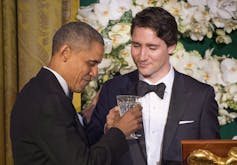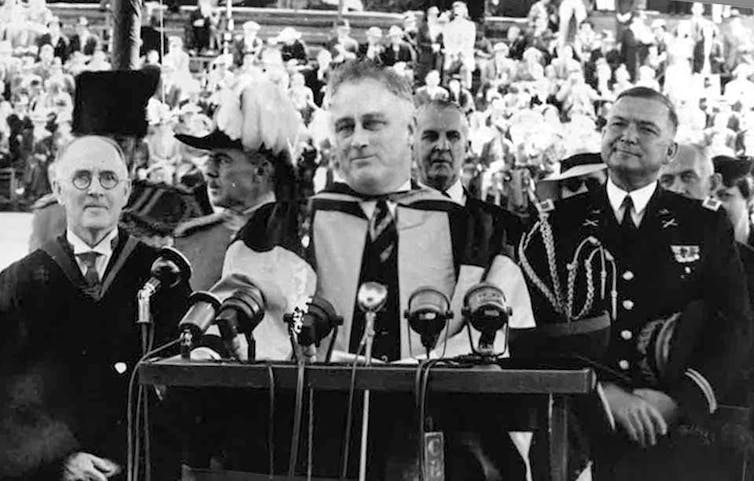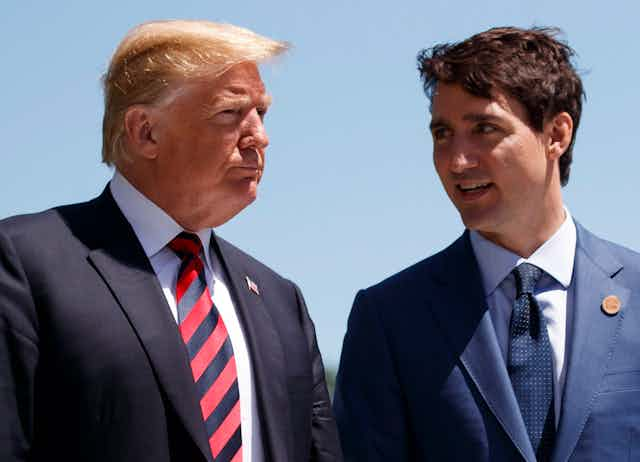Canada-U.S. relations sit at a low point, eroding in recent years over everything from steel tariffs to Cuba and the Arctic.

The current relationship between Canadian Prime Minister Justin Trudeau and U.S. President Donald Trump is more similar to the frosty Lyndon Johnson-Lester B. Pearson years than the storied bromance between Trudeau and Barack Obama.
The easing of tensions could start simply enough. The White House should consider a presidential visit to Canada. Not just a standard visit to Ottawa, however — instead, a reaffirmation of the ties between the two countries in Kingston, Ont.
Why Kingston?
War on the European continent was brewing in 1938, and Canada was entangled in the European orbit even after gaining national sovereignty from Great Britain in 1867.
Canada and the United States, however, were divided over entry into the Second World War.
The Americans were neutral and against intervention, reined in by congressional neutrality acts. Mackenzie King, meanwhile, entered Canada into the war in September 1939 to support the British against the Germans.
A year before Canada’s involvement, U.S. President Franklin D. Roosevelt had visited Kingston, on the shores of eastern Lake Ontario, to meet with King. Both leaders understood the looming threat of Adolf Hitler’s Germany to the security of both countries.

Roosevelt vowed “the United States will not stand idly by if domination of Canadian soil is threatened by any other empire.” King made similar assurances in a speech in Woodbridge, Ont., pledging support to America’s security.
The Kingston visit was symbolic and enduring. The United States apparently shifted away from its isolationist stance, assuring Canada it had a reliable partner to the south.
Canadian political science professors David Haglund and Michel Fortmann have referred to this historic visit as the “Kingston Dispensation.” Each country exchanged a “neighbourly obligation” to elevate the other’s security interests to that of their own.
The Kingston Dispensation also laid the groundwork for North American security at the onset of the Second World War. Two short years later, the Ogdensburg Agreement cemented the bilateral security commitment.
A visit to Kingston could, once again, play a role in bridging relations between Canada and the United States.
Current state of affairs
Only 25 per cent of Canadians view Trump positively, according to a 2018 Pew Research poll, a departure from Obama’s ratings, which were above 80 per cent for most of his presidency.
Since his election in 2016, Trump’s primary Canadian objective was the renegotiation of NAFTA. He labelled Canada a national security threat to justify tariffs on steel and aluminum.
Canada arrested Huawei executive Meng Wanzhou, honouring an extradition request from the United States. But it now finds itself in the middle of a broader U.S.-China standoff, and China has retaliated by indefinitely detaining two Canadian citizens and restricting imports of canola seed, affecting Canadian farmers.
The U.S. and Canada are at odds over the role of Cuba in the Venezuela crisis. The Trump administration opposes Cuba’s alleged backing of Nicolas Maduro’s regime. Trudeau, however, says Cuba can play a “positive role” in Venezuela’s stability.
Read more: The US-Venezuela-Cuba triangle
And recently, U.S. Secretary of State Mike Pompeo contradicted the terms of the 1988 Ronald Reagan-Brian Mulroney agreement on the Arctic, calling Canada’s claim over the Northwest Passage illegitimate. Trudeau reasserted Canada’s Arctic sovereignty claims during Vice-President Mike Pence’s recent Ottawa visit.
‘Uneasy’
An uneasy state is the best way to describe Canada-U.S. relations. But Canada presents the Trump administration with a unique foreign policy opportunity — to create a legacy in North America that’s focused on North American security.
And that legacy can start in Kingston.
Trump’s “America First” strategy is focused on homeland security, reducing foreign commitments, economic security and reassuring allies while deterring enemies.
His North America strategy could start with four key issues: the Arctic, trade, NORAD and halting Chinese ambitions. Each area requires a dynamic relationship with Canada and costs the administration zero political capital.
It could be a policy that goes hand-in-hand with America First.
Most American presidents have conducted state, official, or informal visits to Canada in their first terms. Trump’s sole visit to Canada was at the G7 summit in Charlevoix last June, and it was cut short for the summit in Singapore with North Korean leader Kim Jong-un. It also didn’t go very well, with Trudeau’s public admonishments about U.S. steel tariffs against Canada angering Trump.
Now, however, Trump could establish the foundation of his North America strategy and reaffirm Canada-U.S. relations by an official visit to Canada again — this time in Kingston. It would reaffirm to Americans and Canadians alike that the countries are strong allies just as they were in the Second World War, it would elevate Canada’s security interests under a North America strategy and it would legitimize Trump’s foreign policy objectives.
The Kingston ‘reaffirmation’
Any Kingston reaffirmation must centre on topics unique to Canada-U.S. relations.
Trump and the Canadian prime minister could acknowledge the 60th anniversary of the completion of the St. Lawrence Seaway, outline efforts to modernize NORAD and highlight the potential gains from the new NAFTA.
And there’s also an underlying rallying cry — China’s actions on the world stage.
Trump could urge President Xi Jinping to release Canadian prisoners and scold China for the canola seed dispute.
He could acquiesce to the existing agreement on Canada’s internal Arctic waters, as there is virtually no political base in America focused on the Arctic.
Trump could outline his administration’s North America strategy. It would be good for Canadians, good for Americans and good for the Canada-U.S.relationship.
Neighbours are always going to disagree; it would be naive to think otherwise. Trump’s unscripted nature is particularly challenging for Canada. But a reaffirmation is long overdue — and Kingston would be a fitting locale for such a historic moment.

